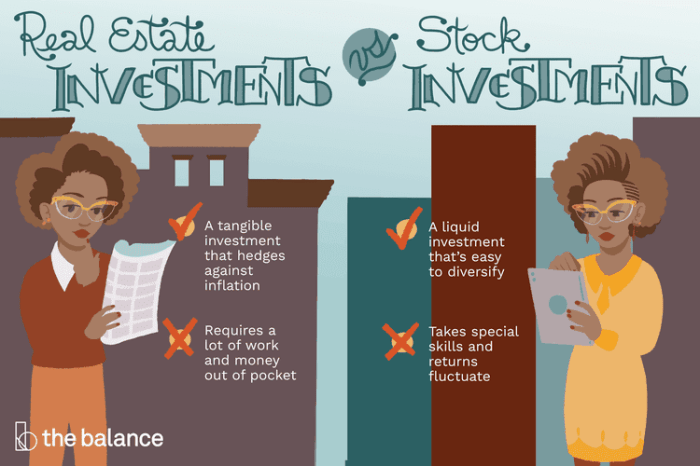Get ready to dive into the world of real estate vs stocks where we break down the pros and cons of each investment option in a way that’s easy to understand and oh-so-hip.
Let’s explore the differences between real estate and stocks, from investment strategies to potential returns.
Real Estate Investment
Real estate investment involves purchasing, owning, managing, renting, or selling properties for the purpose of generating income or profit.
Types of Real Estate Investments
- Residential properties: Houses, apartments, condos, etc., rented out to tenants.
- Commercial properties: Office buildings, retail spaces, warehouses, etc., leased to businesses.
- Industrial properties: Factories, manufacturing plants, distribution centers, etc., used for production or storage.
- Real estate investment trusts (REITs): Companies that own, operate, or finance income-producing real estate across a range of property sectors.
Advantages and Disadvantages of Investing in Real Estate
- Advantages:
- Potential for regular rental income.
- Property value appreciation over time.
- Diversification of investment portfolio.
- Tax benefits like deductions for mortgage interest and property taxes.
- Disadvantages:
- Requires significant capital for initial purchase.
- Ongoing maintenance and management responsibilities.
- Lack of liquidity compared to stocks or bonds.
- Market fluctuations can affect property values.
Comparison of Long-Term Returns
Real estate investments have historically provided competitive long-term returns compared to other asset classes such as stocks, bonds, or cash equivalents. While there may be periods of volatility in the real estate market, well-chosen properties in desirable locations can offer steady income and appreciation potential over time.
Stock Market Investment
Investing in the stock market involves buying shares of publicly traded companies in the hopes of earning a profit through the appreciation of the stock value or receiving dividends.
Process of Buying Stocks
- Open a brokerage account: Choose a brokerage firm to facilitate your stock trades.
- Research and select stocks: Analyze companies and their financial performance to make informed investment decisions.
- Place your order: Decide the number of shares to buy and at what price, then execute the trade through your brokerage account.
Risks Associated with Investing in Stocks
- Market volatility: Stock prices can fluctuate rapidly due to various factors, leading to potential losses.
- Company-specific risks: Individual companies may face challenges that negatively impact their stock value.
- Regulatory risks: Changes in regulations or government policies can affect stock prices and investor sentiment.
Potential for High Returns in the Stock Market
Investing in stocks can offer the potential for high returns compared to real estate due to the higher volatility of stock prices. However, this also means a higher level of risk and uncertainty in the stock market compared to the relatively stable nature of real estate investments.
Risk Assessment

Real estate investments come with their own set of risks. One of the main risks is the lack of liquidity, meaning that it may take time to sell a property and convert it into cash. Market fluctuations can also impact the value of real estate, leading to potential losses for investors. Additionally, unexpected expenses such as repairs or vacancies can eat into profits.
Comparing real estate to stock market investments, stocks are generally considered to be more liquid and volatile. Stock prices can fluctuate rapidly based on market conditions, economic factors, or company performance. This volatility can lead to significant gains or losses within a short period of time.
To manage risk in real estate, investors can diversify their portfolio by investing in different types of properties or locations. Conducting thorough research and due diligence before making a purchase can also help mitigate risks. In stocks, diversification across different industries and asset classes can help reduce risk. Setting stop-loss orders to limit potential losses and staying informed about market trends can also be effective risk management strategies.
External factors such as interest rates, economic conditions, or government policies can impact the risk levels in both real estate and stock investments. For example, an increase in interest rates can make borrowing more expensive for real estate investors, affecting their profitability. Similarly, changes in regulations or geopolitical events can influence stock prices and overall market sentiment.
Market Trends
Real estate market trends are constantly changing based on various factors. These trends can significantly impact investment decisions in both real estate and stocks. Understanding the current market trends is crucial for making informed investment choices.
Factors Influencing Real Estate Market Trends
- Housing demand and supply: The balance between the demand for housing and the supply of available properties can heavily influence real estate market trends.
- Interest rates: Fluctuations in interest rates can affect the affordability of mortgages, impacting the demand for real estate properties.
- Economic conditions: The overall economic health of a region or country can impact real estate market trends, with factors like employment rates and GDP growth playing a significant role.
Economic Conditions and the Stock Market
- Stock prices are heavily influenced by economic conditions such as inflation rates, interest rates, and overall market stability.
- Global economic events can also impact the stock market, including geopolitical tensions, trade agreements, and natural disasters.
- Investor sentiment: The confidence of investors in the economy can drive stock market trends, with positive sentiment leading to increased stock prices.
Impact on Investment Decisions
- Market trends in real estate and stocks can influence investment decisions, with investors adjusting their portfolios based on the current economic climate and projected trends.
- Diversification: Understanding market trends allows investors to diversify their portfolios, reducing risk exposure and maximizing potential returns.
- Timing: Recognizing when to enter or exit the market based on trends can help investors capitalize on opportunities and mitigate losses.